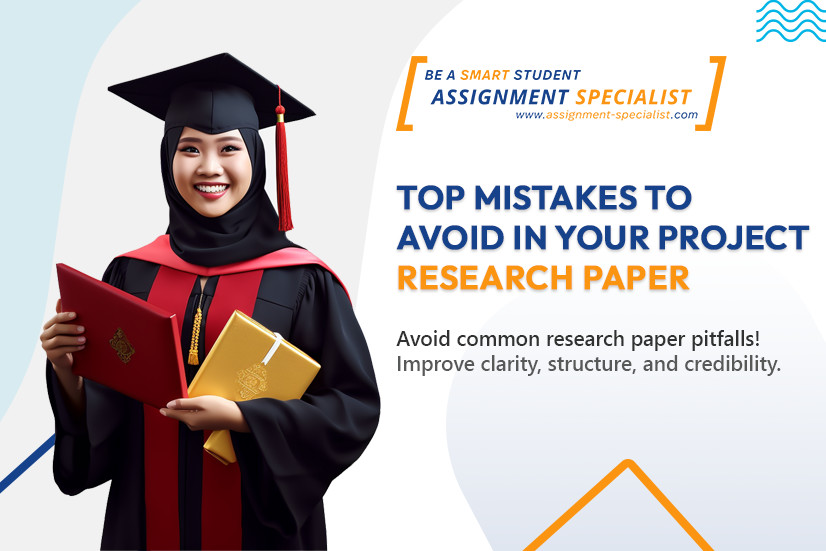Introduction
Writing a project research paper requires careful planning, thorough research, and structured writing. However, many students fall into common traps that can weaken their work. From poor organisation to improper citations, these mistakes can cost valuable marks. In this guide, we’ll highlight the top mistakes to avoid and provide expert tips to enhance your paper. Whether you’re tackling a term paper or seeking guidance from professional academic writers, knowing these pitfalls will help you submit a stronger, well-researched paper.
Key Takeaways
- Avoid poor research and weak thesis statements.
- Ensure proper citations to prevent plagiarism.
- Follow a structured outline to maintain logical flow.
- Edit thoroughly to eliminate grammar and formatting errors.
- Seek term paper writing support if needed.
Deadline stress? Let experts craft your perfect research paper!
Poor Research and Weak Thesis Statements
1. Relying on Unverified Sources
Using unreliable websites or outdated books can weaken your arguments. Stick to credible academic sources like Google Scholar, JSTOR, or university databases. When in doubt, consult your professor or a librarian for guidance.
2. Writing a Vague or Weak Thesis Statement
A strong thesis provides direction for your paper. Ensure it is specific, arguable, and supported by evidence. For example:
- Weak: “Social media affects communication.”
- Strong: “Excessive social media use reduces in-person communication skills among teenagers, leading to social anxiety.”
A good thesis statement acts as a roadmap, guiding your readers through the argument you will develop.
Lack of Proper Structure and Flow
1. Not Following an Outline
A well-structured outline ensures your project research paper flows logically. Before writing, break it into sections: introduction, literature review, methodology, findings, and conclusion. This prevents you from veering off-topic and helps maintain focus.
2. Jumping Between Ideas
Each paragraph should focus on one main idea. Use transition words like “however”, “in contrast”, and “therefore” to create a smooth flow between sections. An unorganised paper confuses readers and weakens your argument.
Struggling with organisation? Get a structured paper without hassle!
Plagiarism and Citation Errors
1. Copying Without Proper Attribution
Plagiarism can result in serious academic penalties. Always cite sources properly using MLA, APA, or Chicago style, depending on your institution’s requirements. Even if you paraphrase, you must acknowledge the original source.
2. Incorrect or Incomplete Citations
Using citation generators like Zotero or Mendeley can help you cite correctly. Ensure all references match your bibliography and follow the right formatting. Double-check citations for accuracy, as incorrect formatting can lead to lost marks.
Weak Arguments and Lack of Evidence
1.Making Claims Without Supporting Data
Every argument should be backed by facts, statistics, or scholarly research. Using peer-reviewed articles strengthens credibility. If an argument is not supported by solid evidence, it will not hold up under scrutiny.
2. Over-Reliance on Personal Opinions
While personal insights add value, your paper should be rooted in factual research. Balance opinions with solid evidence. A research paper is meant to contribute to the academic discussion rather than simply state personal beliefs.
Poor Editing and Formatting
1. Submitting Without Proofreading
Spelling, grammar, and formatting errors lower the quality of your paper. Always proofread before submission. Use tools like Grammarly or Hemingway Editor to spot and correct mistakes. Reading your paper out loud also helps in identifying awkward phrasing.
2. Ignoring Formatting Guidelines
Follow the required format for fonts, margins, and headings. Academic institutions have strict guidelines that must be followed. Ignoring formatting rules can make your paper look unprofessional and lead to unnecessary deductions.
Perfect formatting and grammar? Let professionals refine your work!
Overcoming Writer’s Block
1.Start with Easy Sections First
If you’re stuck, begin with a section you find easiest to write. This builds momentum and makes the rest of the paper easier to tackle. Many students struggle with introductions, so writing the body first can be a useful strategy.
2. Set Mini Deadlines
Break your paper into smaller tasks with deadlines. Completing sections in stages makes the process less overwhelming. Procrastination often results in rushed writing, so setting milestones keeps you on track.
3. Change Your Environment
A new workspace, background music, or a short break can help refresh your mind and boost creativity. Experiment with different settings to find what works best for your concentration and productivity.
The Importance of Revising and Seeking Feedback
1. Taking a Break Before Revising
After finishing your first draft, step away for a few hours or a day before revising. A fresh perspective can help you identify errors and weak arguments more effectively.
2. Seeking Peer or Expert Feedback
Ask a classmate, professor, or professional academic writer to review your paper. Constructive criticism helps improve clarity and strengthens your argument. Editing is a crucial final step before submission.
Conclusion
Avoiding these common mistakes in your project research paper can significantly improve its quality. By using credible sources, maintaining a strong thesis, structuring your content well, and seeking professional academic writers for guidance, you can submit a compelling and well-researched paper. Implement these strategies and take your academic writing to the next level.
FAQs
1.What is the biggest mistake in writing a project research paper?
The biggest mistake is failing to conduct thorough research, leading to weak arguments and poor credibility.
2.How do I properly cite sources in my research paper?
Use citation styles like APA, MLA, or Chicago and tools like Zotero or Mendeley for accuracy.
3. Can professional academic writers help improve my paper?
Yes, they can assist with research, structure, editing, and citations to enhance the quality of your paper.
4. How can I improve my research paper’s structure?
Create a detailed outline, use clear transitions, and follow a logical flow of ideas.
5. What are the best ways to proofread a research paper?
Read it aloud, use grammar tools like Grammarly, and seek term paper writing support for professional editing.


